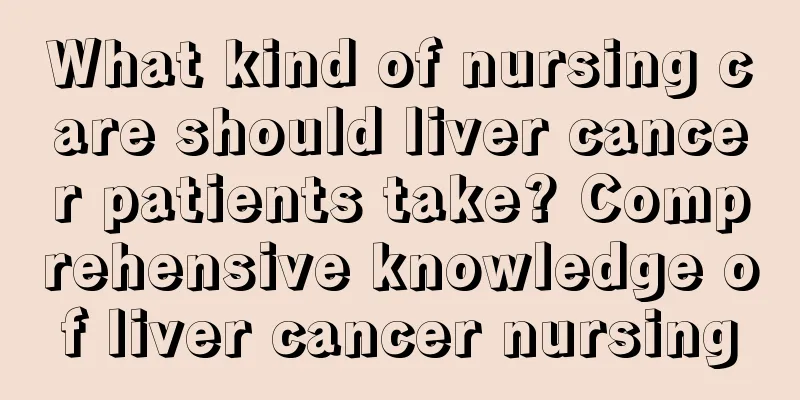What kind of nursing care should liver cancer patients take? Comprehensive knowledge of liver cancer nursing

|
Liver cancer is one of the most common malignant tumors in clinical practice. Its prognosis is poor, especially in the middle and late stages, when treatment is more difficult. In addition to drug treatment, nursing care for liver cancer should also be increased. Good care can improve the patient's condition. Here we mainly introduce the nursing methods for liver cancer. Nursing Home Care The treatment of liver cancer patients is complicated. They need to rest for a period of time during the treatment. They do not need to be hospitalized. Patients can go home to recuperate, which can reduce economic costs and improve the turnover rate of hospital beds. Home care is an integral part of nursing care and is a method of implementing non-hospitalized care for patients. There are certain differences between home care and clinical care in terms of form and quality of care. From the patient's perspective, the patient will have a sense of intimacy and trust, and develop a feeling of mutual support and interdependence, which improves the patient's quality of life. Care content 1. Provide psychological comfort to the patient. Liver cancer patients are irritable and easily angered, and their family members should be understanding and tolerant. 2. Keep the living environment clean and comfortable, and ensure cross ventilation in the room. 3. Basic nursing care should achieve "six cleanliness" (cleanliness of the oral cavity, face, hair, skin of hands and feet, perineum, and bed unit), "five preventions" (prevention of bedsores, prevention of orthostatic hypotension, prevention of respiratory system infection, prevention of intercourse infection, and prevention of urinary tract infection), "three no's" (no feces, no falling from bed, no burns), and "one management" (dietary management). 4. Use medication safely. Take medication on time and in the prescribed dosage according to the doctor's instructions, and keep the medication properly. 5. Provide health education and guide patients to take care of themselves, correct bad living habits, not smoke, not drink, improve self-care ability, avoid the adverse effects caused by harmful stressors, and help them maintain mental and physical balance. 6. Encourage patients to participate in normal life, take part in easy work, learn an appropriate amount of knowledge, and re-establish their own survival value through work and study. Liver cancer folk remedies refer to the methods and contents of adding meals to a normal diet. A good and effective diet therapy can play a good role in the patient's physical recovery. Here are some liver cancer folk remedies: (1) Lily Drink Ingredients: Fresh lily. Usage: Wash the fresh lilies, put them in a pot, add 500 ml of water, boil them over high heat for 3 minutes, then simmer for 30 minutes over low heat, drink in several times, continuously. Efficacy: Nourishing yin and clearing away heat. Indications: Liver cancer of the type characterized by heat toxicity damaging the yin, with distended abdomen, hot flashes, night sweats, dry and hard stools, and short and dark urine. (2) Golden Flower Loofah Drink Ingredients: honeysuckle, old loofah. Usage: Wash honeysuckle and loofah separately, put in a pot, add 1000 ml of water, boil over high heat for 3 minutes, then boil over low heat for 20 minutes, filter the residue to obtain the juice, and drink it in several times. Efficacy: Clears away heat, detoxifies, dredges meridians and relieves pain. Indications: Liver cancer of the type characterized by heat toxicity damaging the yin, stabbing pain under the hypochondrium, dry mouth and fever. Bedsore Care Liver cancer patients are bedridden for a long time, become emaciated, and suffer from general fatigue, which can easily lead to the development of bedsores. The causes of bedsores are: ① local pressure, friction and displacement; ② local tissue ischemia and necrosis; ③ local moisture and stimulation by excrement; ④ insufficient nutrition. The appearance of bedsores is mainly manifested in time as congestion, rashes, blisters, ulcers, local tissue necrosis, and even ulceration, and finally invades the fascia, muscles, bones and other deep tissues. Once bedsores occur, it will not only increase the pain of the patient, aggravate the condition, and prolong the course of the disease, but in severe cases, it may cause sepsis due to secondary infection and endanger life. Therefore, basic nursing must be strengthened to prevent the occurrence of bedsores. The presence or absence of bedsores is one of the important criteria for judging the quality of nursing. (1) Nursing goals 1. Prevent the occurrence or aggravation of bedsores. 2. Promote the healing of bedsore wounds. (2) Nursing measures 1. Prevent bedsores (1) Encourage patients to move or exercise. For patients who cannot move, help them turn over once every 2 hours; patients who can move slightly are encouraged to move in bed or do limb exercises with the help of family members. (2) Instruct the patient on the correct method of turning over, and do not drag the patient to avoid friction that may damage the skin. (3) When lying or sitting for a long time, a small pad should be placed on the bony protrusion to prevent local pressure, and a gauze pad can be used to support the heel. (4) Massage bony protrusions with safflower ethanol every day to prevent bedsores. (5) Keep your skin clean. Wipe your skin with warm water every day. Change clothes that are soiled by excrement and sweat in time. People with dry skin can apply moisturizing cream. (6) Water mattress or air mattress can be used when necessary. (7) Provide adequate nutrition. Provide a high-protein, high-calorie diet. For those who cannot eat, nasogastric feeding or intravenous nutrition can be used. 2. Promote the healing of bedsores (1) Stage I bedsores: Massage the local skin with safflower ethanol twice a day. Use an air cushion to lift the congested area to avoid further local pressure, and instruct the patient to do limb exercises in bed. (2) Stage II bedsores: Rub the ulcer with mercurochrome to tighten the skin and promote local skin healing. Or cover the ulcer with egg membrane. For blisters, use a sterile syringe to aspirate the fluid in the blister, disinfect the needle hole and cover it with sterile gauze. (3) Stage III and IV bedsores: The wound dressing should be changed. Choose appropriate dressings to cover the wound and apply direct pressure to the wound to prevent the patient from bleeding (liver cancer patients have poor coagulation function). Use oily antibiotics to change the wound dressing every day and observe the wound healing. If there is no improvement within a week, bacterial culture of the wound can be performed to find sensitive antibiotics. Psychotherapy (1) Psychological recognition: After a period of time, the patient begins to receive psychological treatment for liver cancer, becomes calm and willing to accept treatment, and places hope on it. Medical personnel should promptly apply "suggestion" therapy, publicize the significance of treatment, and eliminate unfavorable factors for treatment, such as social factors and family factors. (2) Suspicion in the psychological treatment of liver cancer: Once a patient learns that he has liver cancer, he may become restless, seek confirmation from many sources, feel nervous, and become suspicious. Therefore, medical personnel should be cautious in their words and deeds, find out the purpose of the patient's inquiry, conduct psychological treatment for liver cancer, answer the patient's questions scientifically and tactfully, and avoid speaking directly to reduce the patient's degree of shock, so as to prevent the patient from losing confidence in the treatment. (3) Pessimism: When patients are diagnosed with cancer, they will feel pessimistic and disappointed, with more disappointment than expectation, depression, and lack of joy. At this time, medical staff should show concern, explain that the disease is being treated, and emphasize that a good mood is conducive to the prognosis of the disease. (4) Fear: When patients know for sure that they have liver cancer, they often show fear, despair, lose hope of survival, and worry about their loved ones. Nurses should sympathize with patients, give them comfort, and encourage them to actively accept treatment to avoid delaying the disease. They should also emphasize the role of psychology in the disease and encourage patients to accept treatment with a positive attitude. (5) Disappointment or optimism: In terms of speech, medical staff should be kind and patient, caring and considerate, and speak in a gentle tone. They should listen carefully during the conversation, not interrupt at will, and pay attention to observing the patient's condition, understanding his thoughts, and accepting reasonable suggestions. In the process of conversation, they should pay attention to protective language, and the diagnosis, treatment and prognosis of the patient should be rigorous and scientifically based. They must not be subjective and arbitrary, or make random guesses. Because everyone's physique and degree of adaptation are different, the treatment effect is also different. Some patients have their condition under control, are good at adjusting their mind, and live in a harmonious emotional environment. The patient is in an optimistic state for a long time. Some gradually deteriorate, have a large response to treatment, are burdened with heavy economic burdens, are physically exhausted, and are mentally depressed, waiting for death passively. Medical staff should analyze the reasons for negative patients, provide psychological comfort, adjust the patient's mentality in time, and provide life guidance; for optimistic patients, they should provide rehabilitation guidance and pay attention to observing psychological changes so as to find problems and solve them in time. In addition, medical staff should also have skilled nursing skills and good psychological qualities to make patients feel psychologically satisfied and happy. High-risk groups for liver cancer The early symptoms of liver cancer are usually very hidden. Many patients have almost no symptoms in the early stage of liver cancer, but when obvious liver cancer symptoms appear, it is already in the middle and late stages. Liver disease experts point out that doing a good job of liver cancer prevention can effectively reduce the incidence of liver cancer, especially for people at high risk of liver cancer. It is very important to do a good job of liver cancer prevention. According to liver disease experts, people with the following characteristics are at high risk of liver cancer and should take good measures to prevent it: 1. Chronic hepatitis history of more than 5 years, among which hepatitis B patients have the highest risk of liver cancer; 2. There is a confirmed liver cancer patient in the family; 3. Chronic alcoholics; 4. Those who consume pickled, smoked, moldy or other foods for a long time; 5. People who suffer from long-term work pressure, heavy workload or long-term mental depression are at high risk of liver cancer. Since there are basically no obvious symptoms in the early stages of liver cancer, about 70% of small liver cancers with a diameter of less than 5 cm usually have no symptoms, and it is difficult for patients to detect them themselves. Therefore, people at high risk of liver cancer must pay attention to health examinations. People over 40 years old at high risk of liver cancer should undergo liver B-ultrasound and alpha-fetoprotein (AFp) examinations every six months to a year. For about 60% of people at high risk of liver cancer in my country, alpha-fetoprotein is a very practical test that can make early diagnosis of liver cancer six months to a year before the symptoms of liver cancer appear. For early liver cancer with no symptoms, most "small liver cancers" can be screened out through liver B-ultrasound and alpha-fetoprotein examinations. When treating liver cancer patients, active nursing care often has great benefits for the condition and has a very good promoting effect on improving the patient's physiological condition and body state. I hope that the nursing points introduced here can be helpful in the clinical care of liver cancer patients. |
Recommend
How do transgender people live as a couple
In today's society, with the development of v...
What to do if liver cancer nodules rupture and bleed
Spontaneous rupture and bleeding of liver cancer ...
Is acupuncture effective in treating vertigo?
People must have experienced dizziness in their d...
Cured by Gallbladder Cancer
Gallbladder cancer has an insidious onset, lacks ...
Is the pain in the anus caused by getting angry?
Pain in the anal area may be related to getting i...
What causes genital herpes
Genital herpes is a relatively complicated diseas...
How to determine the thickness of the stratum corneum?
As we all know, human skin includes the stratum c...
How to provide psychological care for liver cancer patients? Detailed description of the psychological and nursing strategies for liver cancer patients
Psychological manifestations and nursing strategi...
How to boil malt hawthorn water to make milk
For many breastfeeding women, when it comes time ...
How to remove oil stains from clothes
As living standards continue to improve, more and...
What to do if kidney cancer metastasizes or spreads
In recent years, kidney cancer has become one of ...
Is it necessary to store the mask in the refrigerator?
Nowadays, women have a lot of beauty and skin car...
What is the best medicine for itching under the body
Everyone should pay more attention to personal hy...
How can we prevent bone cancer
How can we prevent bone cancer? Bone cancer is a ...
Talk about the diagnosis of testicular cancer
Testicular cancer has a great impact on the patie...









